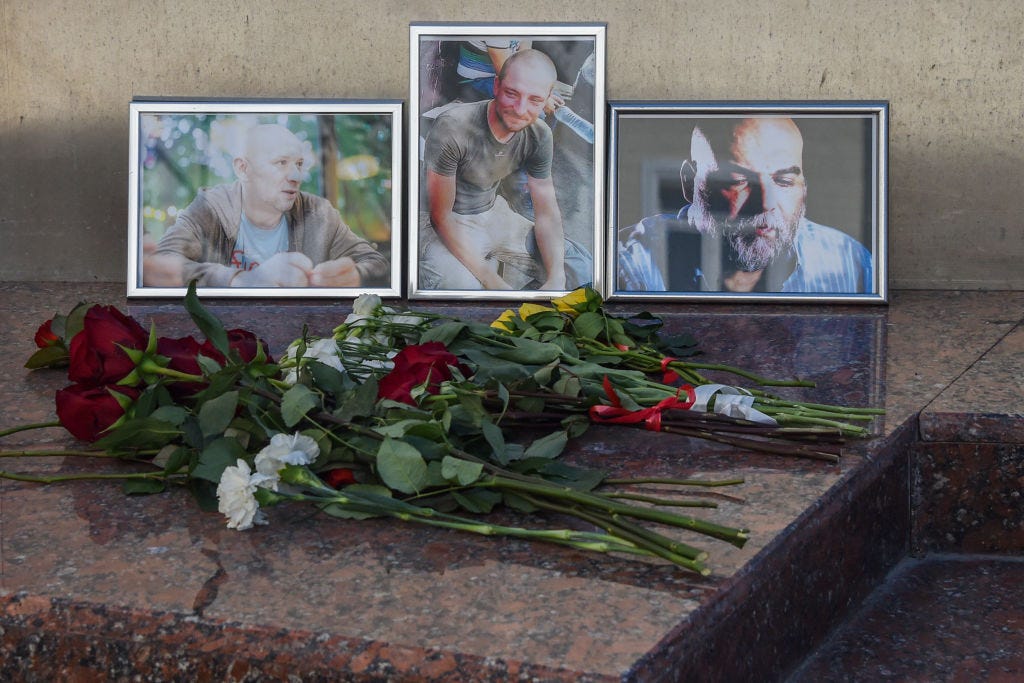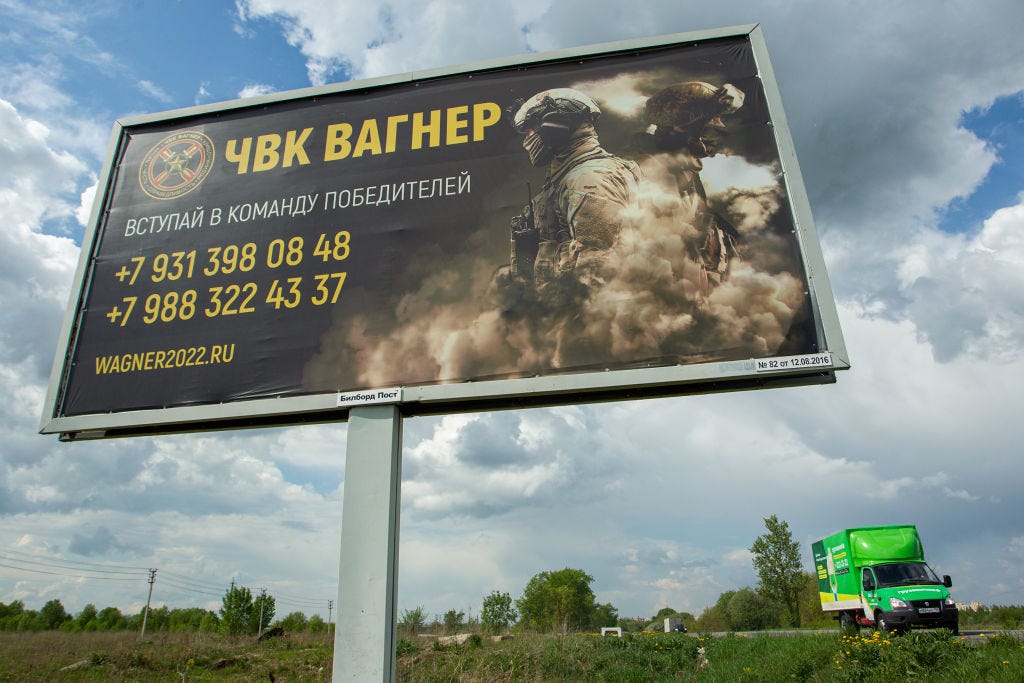Darkness, disinformation and denial: our years reporting Prigozhin
Some will mourn his passing, but the new depths of cynicism and violence Yevgeny Prigozhin brought to Russia will not be missed
By Jenny Norton.
“Look, I have to ask this,” says a BBC Russian senior editor, the morning after the news broke of Prigozhin’s apparent death. “Does anyone think there’s a possibility that he might not be dead at all?”
It says everything about Yevgeny Prigozhin, and the dark world of disinformation and menace he inhabited, that even as his death was emblazoned in headlines across the world, so many people who have followed his story over the years were still asking themselves, could this all be a hoax?
In life and now in death, the precise facts surrounding Prigozhin’s world have always been frustratingly hard to pin down. Almost everything about him has been obscured by a fog of often implausible, but nonetheless impenetrable denial.
Just the day before his death BBC Russian published the strange story of former Russian police officer now serving time in prison who had changed his name by deed poll to Yevgeny Prigozhin, and was now petitioning to change it back.
He was, we discovered one of many people connected to the Wagner chief who at various times have changed their names, creating a network of alternative Prigozhin’s fronting companies, travelling round the country and sometimes abroad, leaving the boss free to operate below the radar, beyond the law, and safely out of reach of those seeking to do him harm.
For journalists who have been following Prigozhin and the Wagner group for much of the past decade, it’s been a difficult and often dangerous task.
He seemed to be everywhere, running catering companies, troll factories, ‘political technologists’ and mercenaries. Meddling in elections from the US to Madagascar, providing security for questionable regimes from Syria to Sudan. But attempts to confirm his connection to most of this unlikely empire, were always brushed aside with the same jokey and yet somehow menacing replies.
Those who tried to push harder would soon find to their cost that a man who had money, connections and guns for hire at his disposal could prove a formidable opponent.
At best you could end up mired in endless crippling libel actions, as happened to opposition politician Aleksey Navalny and his team.
At worst you risked ending up dead, like the three Russian journalists who travelled to the Central African Republic in 2018 to investigate the Wagner group’s activities and were gunned down by unknown assailants en route to a goldmine apparently taken over by a Wagner linked company.

In 2021 the BBC Russian and Arabic Services went to St Petersburg to film some sequences for a documentary about alleged war crimes committed by Wagner Group operatives in Libya.
The team were followed, secretly filmed and then subject to a barrage of absurd but very unsettling fake stories on media outlets connected to Prigozhin – some complete with entirely fabricated WhatsApp conversations between our reporters and editors in Moscow.
When the film was broadcast, it was immediately lambasted by Prigozhin. Two of the Wagner mercenaries we had identified as being involved in the Libya fighting, and in particular in the killing of civilians, sent almost identical letters to the BBC denying any connection to Wagner, threatening court action and demanding a retraction.
What followed for me, was a masterclass in Prigozhin trolling.
I replied to the emails, but the addresses used had already been deactivated. I wrote letters, but the postal addresses they gave us were not real. I kept meticulous records of every attempt via the Russian postal service, and courier companies to prove we were trying to engage with the complaints. Meanwhile the legal proceedings ploughed on regardless. The cases came to court in Russia, and only came to a halt when it emerged that one of the men had been killed fighting with the Wagner group in Ukraine.
For the thousands of former soldiers and later serving prisoners who Prigozhin recruited to the ranks of the Wagner group, his macho style and bravado clearly struck a chord. He came from the criminal underworld, he spoke its language and had done time in prison.
On social media channels connected to the group former and current fighters seemed to revel in the legends the group created around itself. Wagner was the ‘orchestra’, its freewheeling fighters were ‘the musicians’ going ‘on tour’ to hot spots around the world. And Prigozhin was there in the centre, the tough-talking conductor who commanded both loyalty and respect.
But for many recruits life in the ‘orchestra’ was only ever about one thing.
“This isn’t about any moral principles,” one ex fighter told BBC Russian in a rare interview. “All that matters is the money.”
For young Russian men from small towns and villages with no jobs, no prospects and no future, Yevgeny Prigozhin offered the promise of a way out. A tour overseas with the Wagner group could earn you the equivalent of more than two thousand dollars a month – an unimaginable sum for your average Russian. If you survived, your troubles were over, if you didn’t, the ‘office’ as they also called it, would pay compensation to your family.
As the war in Ukraine ground on, Prigozhin told the same story to prisoners in Russian jails - join us, earn some money and if you survive you’ll go free.
Thousands believed him, and as they headed to the frontline, and many to their deaths, his PR machine churned out videos - Prigozhin on the frontline, standing shoulder to shoulder with his troops. Prigozhin addressing the first passing out parade for newly pardoned fighters. Don’t drink, don’t do drugs and don’t rape any women, he told them with a knowing grin.
He projected an image that he was one of them, but in reality his world of mansions, top end restaurants and private jets could not have been further from theirs.
In our coverage of the Wagner group over the years, BBC Russian reporters have met many families whose sons, fathers and husbands have been killed fighting in Syria, Libya and Ukraine. Most were in Russia, but in recent years a growing number were from neighbouring states like Kyrgyzstan and Tajikistan. Many are still searching for their graves and struggling to get compensation from the group. Some had no idea what had happened to their loved ones until the BBC contacted them.
We have also spoken to the mothers of murder victims, despairing at the prospect of their children’s killers walking free from jail, after fighting with Wagner in Ukraine.
Last year BBC Russian heard from Anastasia Nuzhina, whose father-in-law had joined the Wagner group from prison.
What persuaded 55-year old Yevgeny Nuzhin to risk everything when he had just four years left of a 28 year sentence for murder, is still a mystery. But what happened to him next is not.
Just weeks after being deployed to the frontline he was captured by Ukrainian forces. A few months later he appeared in a video apparently back in Russia, being bludgeoned to death on camera with a sledgehammer in an apparent Wagner revenge killing.
“A dog’s death for a dog,” Yevgeny Prigozhin commented in a statement released by his press service. “Excellent directorial work.”
There will be those still loyal to Prigozhin who will mourn his death, but for the many bereaved families we have met while reporting his misadventures over the years, the new depths of violence and cynicism which the Wagner group and its leader have brought to Russia will not be missed.
“The things that happened are on the conscience of those responsible,” Anastasia Nuzhina told the BBC last year. “Everything will come back on their own heads."
A version of this story was first published by inews.










